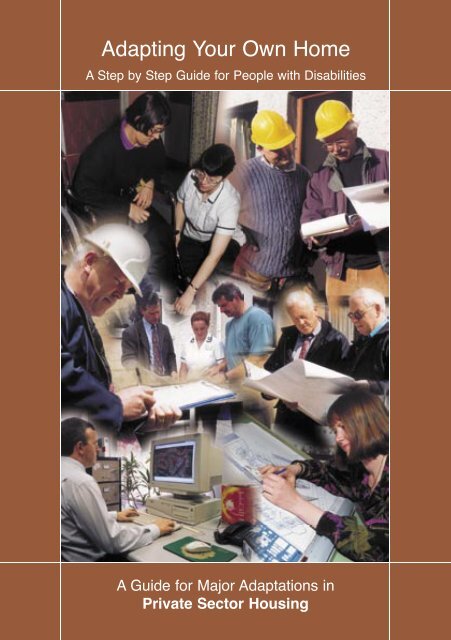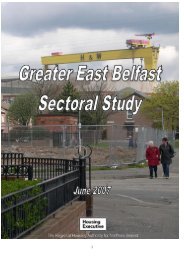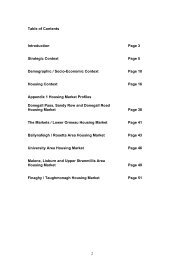Adapting your own home - Northern Ireland Housing Executive
Adapting your own home - Northern Ireland Housing Executive
Adapting your own home - Northern Ireland Housing Executive
Create successful ePaper yourself
Turn your PDF publications into a flip-book with our unique Google optimized e-Paper software.
<strong>Adapting</strong> Your Own Home<br />
A Step by Step Guide for People with Disabilities<br />
A Guide for Major Adaptations in<br />
Private Sector <strong>Housing</strong>
Contents<br />
Acknowledgements . . . . . . . . . . . . . . . . . . . . . . . . 2<br />
<strong>Adapting</strong> Your Home to Meet Your Needs . . . . . . . 3<br />
Who is Involved? . . . . . . . . . . . . . . . . . . . . . . . . . . 4<br />
How Long Does It Take? . . . . . . . . . . . . . . . . . . . . 6<br />
Getting Started . . . . . . . . . . . . . . . . . . . . . . . . . . . . 8<br />
Step 1: The OT Assessment Process . . . . . . . . . 9<br />
Checklist . . . . . . . . . . . . . . . . . . . . . . . . . 11<br />
Step 2: Designing the Adaptation . . . . . . . . . . . 12<br />
The Design Process . . . . . . . . . . . . . . . 13<br />
Checklist . . . . . . . . . . . . . . . . . . . . . . . . 14<br />
Step 3: Getting Your Grant Approved . . . . . . . . 15<br />
Checklist . . . . . . . . . . . . . . . . . . . . . . . . 16<br />
Step 4: Building Work and Grant Payment . . . . 18<br />
Checklist . . . . . . . . . . . . . . . . . . . . . . . . 19<br />
Your Contact With Us. . . . . . . . . . . . . . . . . . . . . . 20<br />
Your Local Contacts . . . . . . . . . . . . . . . . . . . . . . . 21<br />
Glossary of Terms . . . . . . . . . . . . . . . . . . . . . . . . 24<br />
1
Acknowledgements<br />
The DHSSPS and the <strong>Housing</strong> <strong>Executive</strong> would like<br />
to thank the following agencies who made a direct<br />
and valuable contribution to this booklet.<br />
Belfast City Council Building Control<br />
College of Occupational Therapists Specialist<br />
Section in <strong>Housing</strong><br />
The Community Occupational Therapy Managers<br />
Forum (NI)<br />
Disability Action NI<br />
Disabled Persons <strong>Housing</strong> Service (Edinburgh)<br />
Family Information Group<br />
ʻStaying Putʼ, Fold <strong>Housing</strong> Trust<br />
Foyle Disability Resource Centre<br />
Eastern Health and Social Services Council<br />
<strong>Northern</strong> Health and Social Services Council<br />
Southern Health and Social Services Council<br />
Western Health and Social Services Council<br />
Multiple Sclerosis Society<br />
Rate Collection Agency<br />
Royal National Institute for the Blind<br />
Gable<br />
2
<strong>Adapting</strong> Your Home to Meet Your Needs<br />
If you, or someone living with you in <strong>your</strong> property<br />
has a disability, you may qualify for grant aid<br />
(following a financial means test) towards the cost<br />
of adaptations to <strong>your</strong> main residence to help you to<br />
continue to live at <strong>home</strong>. A new means test will not<br />
be applied where the person with a disability is a<br />
dependent, up until their 19th birthday.<br />
This guide takes you through the process of adapting<br />
<strong>your</strong> <strong>own</strong> property. The process is complicated so we<br />
have tried to simplify it into four main steps and give<br />
approximate time-scales for each step.<br />
The <strong>Northern</strong> <strong>Ireland</strong> <strong>Housing</strong> <strong>Executive</strong> and<br />
the Health and Social Services Trusts work in<br />
partnership to help you adapt <strong>your</strong> <strong>home</strong>.<br />
As the speed of this process partly depends on how<br />
quickly you can obtain and pass on information and<br />
documentation to relevant bodies, a checklist is<br />
provided to give you more control over the adaptation<br />
process.<br />
Some avoidable pitfalls are<br />
identified by a caution symbol<br />
!<br />
£<br />
while tips on keeping the cost of the<br />
adaptations d<strong>own</strong> are identified by a<br />
money saving tips symbol<br />
3
Who is Involved?<br />
A number of people may be involved (contact details<br />
can be found at the back of this booklet) including:<br />
Occupational Therapists (OTs)<br />
Occupational Therapists (OTs) advise on what is<br />
"necessary and appropriate" to meet needs. They will<br />
assist you in choosing an adaptation design that will<br />
help you to be independent or help others to care for<br />
you.<br />
<strong>Housing</strong> <strong>Executive</strong> Grants Officers<br />
The <strong>Housing</strong> <strong>Executive</strong> commences its involvement<br />
in the process following receipt of the OTs<br />
recommendation. <strong>Housing</strong> <strong>Executive</strong> Grants Officers<br />
decide what work is "reasonable and practicable" for<br />
grant purposes and will help you through the grant<br />
system.<br />
Technical Advisors<br />
You may also need specialist technical advice<br />
on the work to be done. This advice may come<br />
from architects, building surveyors or on occasion<br />
representatives specialising in products for people<br />
with disabilities.<br />
4
Home Improvement Agencies (Care and Repair<br />
Agencies)<br />
The <strong>Housing</strong> <strong>Executive</strong> Grants Offices have<br />
arrangements with Home Improvement Agencies<br />
to act as an agent for you throughout the<br />
grant application, relieving you of some of the<br />
responsibilities involved in completing the grants<br />
process. However they cannot speed up the grant.<br />
It is <strong>your</strong> choice whether you avail of this free<br />
service.<br />
The Builder<br />
Warranted builders are required for work over<br />
£5,000.<br />
5
How Long Does It Take?<br />
Step 1<br />
Occupational Therapy Assessment of <strong>your</strong> needs<br />
The Community Charter states that this service aims<br />
to initiate <strong>your</strong> assessment within three months. Your<br />
local Health and Social Services Trust will strive<br />
to meet this standard but in practice it can take<br />
longer, due to local service demand, the relative<br />
priority of <strong>your</strong> situation and staffing levels. Once<br />
made, the Occupational Therapist will forward the<br />
recommendations to the local Grants Office.<br />
Step 2<br />
Designing the adaptations<br />
Once the OT recommendation has been received,<br />
the local Grants Office will arrange a site inspection<br />
within 10 working days. A schedule of works will be<br />
issued after a further 20 days, subject to receipt of<br />
information or reports required.<br />
Step 3<br />
Getting <strong>your</strong> grant approved<br />
Up to six months.<br />
Step 4<br />
Building work<br />
Three to four months.<br />
6
Some of the time scales may overlap in practice.<br />
The target times aim to restrict the <strong>Housing</strong><br />
<strong>Executive</strong>s total processing time to 70 days<br />
(14 weeks). However it may take some time for<br />
the applicant to gather together all the necessary<br />
documentation. Fold and Gable can assist the<br />
applicant in this process.<br />
In the meantime the Occupational Therapist may<br />
provide equipment or minor adaptations such as<br />
rails to promote quality of life in the <strong>home</strong> or Social<br />
Services may review <strong>your</strong> <strong>home</strong> care if necessary.<br />
7
Getting<br />
Started<br />
You can either<br />
apply through<br />
you GP, Social<br />
Worker or<br />
to <strong>your</strong> local<br />
Occupational<br />
Therapy<br />
service.<br />
Up to date<br />
medical<br />
information<br />
from <strong>your</strong><br />
GP or hospital<br />
consultant<br />
helps the Occupational Therapy service identify <strong>your</strong><br />
needs more rapidly.<br />
If you require other works of repair or improvement,<br />
the <strong>Housing</strong> <strong>Executive</strong> Grants Office can give you<br />
information on the range of grants available to<br />
improve <strong>your</strong> <strong>home</strong>.<br />
8
Step 1<br />
The Occupational Therapy<br />
Assessment Process<br />
When a referral is received and accepted by the<br />
HSS Trust, <strong>your</strong> Occupational Therapist will carry<br />
out an assessment, which looks at both <strong>your</strong><br />
needs and, where appropriate <strong>your</strong> carers needs,<br />
to decide whether they can be met through a<br />
range of services. The Occupational Therapist will<br />
then discuss options with you. These may include<br />
rehabilitation, referral to other Health and Social<br />
Services professionals, provision of daily living<br />
equipment, moving <strong>home</strong> or adapting <strong>your</strong> <strong>home</strong>.<br />
In many instances where needs are less complex<br />
it will be possible to make a recommendation<br />
for an adaptation early on. On some occasions<br />
where needs are complex, more information may<br />
be needed from other Health and Social Services<br />
personnel to identify both short and long term<br />
needs. This may involve contact with people such<br />
as <strong>your</strong> hospital consultant regarding <strong>your</strong> condition.<br />
The Occupational Therapy service aims to obtain<br />
this information within six months as stated in the<br />
Community Charter.<br />
9
If adapting <strong>your</strong> <strong>home</strong> is an option, the Occupational<br />
Therapist will assess the layout of <strong>your</strong> property in<br />
order to help you with <strong>your</strong> daily living requirements<br />
or to enable you to care for the person with a<br />
disability. The Occupational Therapist will also work<br />
with special equipment suppliers where this is a<br />
necessary part of the adaptation.<br />
The Estate Services Departments of Health<br />
and Social Services Trusts may provide certain<br />
minor works e.g. stair or grab rails following an<br />
Occupational Therapy recommendation. They may<br />
also provide lifts where they are recommended by<br />
the Occupational Therapist.<br />
10
When certain types of adaptations such as<br />
bedrooms, showers or ground floor toilets are<br />
recommended by the Occupational Therapist they<br />
will notify the <strong>Housing</strong> <strong>Executive</strong> grants department<br />
so that eligibility for grant aid can be considered.<br />
Step 1 Checklist:<br />
Occupational Therapy Assessment<br />
You will need to have:<br />
1. Agreement with <strong>your</strong> Occupational<br />
Therapist about <strong>your</strong> needs, and<br />
where appropriate <strong>your</strong> carers needs<br />
following assessment. . . . . . . . . . . . . .<br />
2. An assessment of <strong>your</strong> <strong>home</strong><br />
environment and ideas about options<br />
for adaptation. . . . . . . . . . . . . . . . . . . .<br />
3. An Occupational Therapy<br />
recommendation and brief for the<br />
adaptation . . . . . . . . . . . . . . . . . . . . . .<br />
11
Step 2:<br />
Designing the Adaptation<br />
The <strong>Housing</strong> <strong>Executive</strong> Grants Office administers the<br />
process following receipt of the OT recommendation.<br />
You can also receive assistance from <strong>your</strong> local<br />
Home Improvement Agency if you wish (see contact<br />
details at the end of the booklet).<br />
The Grants Officer will visit <strong>your</strong> <strong>home</strong>, possibly<br />
together with the Occupational Therapist to look at<br />
the condition of <strong>your</strong> property and to make sure the<br />
recommended adaptation is feasible.<br />
The Grants Officer will explain the type and level of<br />
grant aid available. The Disabled Facilities Grant<br />
(DFG) is commonly used to fund major housing<br />
adaptations. As a means test is involved, some<br />
people will be required to make a contribution to the<br />
cost of the adaptation work. A means test will not be<br />
applied where the disabled person is a dependent,<br />
up until their 19th birthday.<br />
!<br />
If you are in any way unsure of the contribution you<br />
may have to make to the adaptation, it is advisable<br />
to request a preliminary test of resources (means<br />
test) early on to help with financial planning.<br />
Having looked at options, it may also be suggested<br />
that you get further technical advice from an<br />
architect, building surveyor or specialist equipment<br />
suppliers.<br />
12
The Design Process<br />
The Occupational Therapist will produce a brief,<br />
which outlines the nature of the essential adaptations<br />
needed.<br />
The Grants Officer will produce the necessary<br />
schedule of grant-aided works for the adaptation.<br />
You may also receive a separate schedule of works<br />
to address unfitness or disrepair in <strong>your</strong> <strong>home</strong>.<br />
Where work is more complex you will need to<br />
employ a "technical advisor" to produce drawings/<br />
specifications and obtain the necessary statutory<br />
approvals.<br />
Taking time to get the plans right by talking to the<br />
Occupational Therapist, Grants Officer and Architect<br />
can save time and money later on.<br />
A contribution towards the fees involved for this can<br />
be paid as part of the Disabled Facilities Grant, once<br />
it is approved. Remember that if you withdraw from<br />
the grants system before work is complete you will<br />
still have to pay the architect or designer for plans<br />
and other fees.<br />
£<br />
!<br />
13
Step 2 Checklist:<br />
Designing the Adaptation<br />
You will need to have:<br />
1. Permission from the <strong>own</strong>ers of <strong>your</strong> <strong>home</strong><br />
for adaptations (if you are not the <strong>own</strong>er)<br />
or proof that you <strong>own</strong> <strong>your</strong> <strong>own</strong> <strong>home</strong>. . .<br />
2. Completed a preliminary enquiry form . .<br />
3. An agreement with <strong>your</strong> Occupational<br />
Therapist, <strong>Housing</strong> <strong>Executive</strong> Grants<br />
Officer and "technical advisors" on one<br />
adaptation design to meet <strong>your</strong> needs . .<br />
4. Drawings (if necessary) to illustrate the<br />
proposed adaptation . . . . . . . . . . . . . . . .<br />
5. A schedule of work produced by the<br />
Grants Office . . . . . . . . . . . . . . . . . . . . . .<br />
6. Details of what funding you may be<br />
entitled to and/or what <strong>your</strong> contribution<br />
may be - Preliminary test of resources . .<br />
7. Considered the need for temporary<br />
alternative accommodation during<br />
building work . . . . . . . . . . . . . . . . . . . . . .<br />
14
Step 3: Getting Your Grant Approved<br />
Either you or <strong>your</strong> architect must send the schedule<br />
to builders to get a quote for the work required. If<br />
needed, the <strong>Housing</strong> <strong>Executive</strong> Grants Office can<br />
supply you with a list of contractors in <strong>your</strong> area. The<br />
builder will need to visit <strong>your</strong> <strong>home</strong> to give you an<br />
accurate quotation and you may need to shop about<br />
for prices.<br />
You may be entitled to exemption from VAT for all or<br />
part of <strong>your</strong> essential adaptation work. Check with the<br />
VAT office or phone the help-line on the back page.<br />
Planning permission and Building Control approval<br />
may also need to be obtained. There may be<br />
exemptions on fees for some or all of the adaptation<br />
work. Check this with <strong>your</strong> local Building Control<br />
service.<br />
£<br />
£<br />
Your Architect or Technical Advisor will do most of<br />
this preliminary work for you.<br />
If you are not receiving the assistance of <strong>your</strong> local<br />
Home Improvement Agency the <strong>Housing</strong> <strong>Executive</strong><br />
Grants staff can give assistance with the completion<br />
of forms. If you have any problems contact the<br />
Grants Office.<br />
If you are not eligible for a grant we may need to<br />
discuss alternatives.<br />
15
Step 3 Checklist:<br />
Getting Your Grant Approved<br />
You will need to have:<br />
1. Completed the Disabled Facilities Grant<br />
(DFG) Application form and also formal<br />
test of resources form and provided<br />
proof of income . . . . . . . . . . . . . . . . . . .<br />
2. An account or estimate for professional<br />
fees e.g. architects fees. . . . . . . . . . . . .<br />
3. Planning and building control permission<br />
(where necessary) . . . . . . . . . . . . . . . . .<br />
4. Proof that you <strong>own</strong> <strong>your</strong> <strong>own</strong> <strong>home</strong><br />
or evidence of permission for the<br />
adaptation from the <strong>home</strong><strong>own</strong>er<br />
(certificate of <strong>own</strong>er occupation/tenantʼs<br />
certificate/Certificate of title) . . . . . . . . .<br />
5. Certificate of future occupation/intended<br />
letting (where appropriate). . . . . . . . . . .<br />
6. An estimate from a builder (warranted, if<br />
work costs over £5,000) . . . . . . . . . . . .<br />
16
7. Approval of plans by the Grants<br />
department and the OT department . . .<br />
8. Mortgageeʼs consent . . . . . . . . . . . . . .<br />
9. Authorisation certificate(s) (completed<br />
by people other than the applicant who<br />
hold title to the grant property) . . . . . . .<br />
10. Rate Demand. . . . . . . . . . . . . . . . . . . . .<br />
If you feel <strong>your</strong> situation has changed considerably<br />
since the assessment by the Occupational Therapist,<br />
notify <strong>your</strong> therapist if they are not already aware of<br />
<strong>your</strong> situation, before proceeding with building work.<br />
Remember – you must not start any building work<br />
until the grant has been approved.<br />
!<br />
!<br />
17
Step 4:<br />
Building Work and Grant Payment<br />
!<br />
The Grants Officer will issue a formal approval to<br />
you if you are successful in <strong>your</strong> application for<br />
a Disabled Facilities Grant. At this stage you can<br />
commence building.<br />
Work should commence within eight weeks and<br />
finish within a further twelve months of this approval.<br />
Either you or <strong>your</strong> technical advisor should speak<br />
to the chosen builders to set a date for the work to<br />
begin. While the Grants Office wishes to see the<br />
work progressing rapidly they have no direct control<br />
over the builder.<br />
Practical arrangements may need to be made with the<br />
builder and on occasion it may be necessary for you<br />
to move out temporarily while the work is going on.<br />
There may be exceptional circumstances where<br />
interim payments can be made. Check this with <strong>your</strong><br />
local <strong>Housing</strong> <strong>Executive</strong> Grants Office.<br />
!<br />
You should contact the <strong>Housing</strong> <strong>Executive</strong> when the<br />
work is completely finished. The final grant cannot<br />
be paid until <strong>your</strong> builder has completed all the work<br />
outlined on the schedule.<br />
18
The Grants Officer will try to visit within 2 weeks<br />
of receiving notification from you that the work is<br />
completed. Following this the Occupational Therapist<br />
will inspect the adaptations. If everyone is satisfied<br />
with the work the relevant payments will be made.<br />
When required, the Occupational Therapist will<br />
provide equipment such as a shower chair to help<br />
you use <strong>your</strong> new facilities.<br />
The ongoing maintenance of the adapted property is<br />
the <strong>home</strong><strong>own</strong>ersʼ responsibility.<br />
The Rate Collection Agency can advise you on<br />
whether a rate rebate (Disabled Persons Allowance)<br />
will apply to <strong>your</strong> housing adaptation. (See contact<br />
number for advice)<br />
£<br />
Step 4 Checklist:<br />
Building Work and Grant Payment<br />
You will need to have:<br />
1. Formal approval to commence work . . . .<br />
2. A date for the builder to start and<br />
complete the work . . . . . . . . . . . . . . . . . .<br />
3. Approval of the completed adaptations by<br />
the relevant professionals . . . . . . . . . . . .<br />
19
Your Contact With Us<br />
Occupational Therapists, <strong>Housing</strong> <strong>Executive</strong> Grants<br />
Officers and other staff are often out on visits to other<br />
people during the day. If you need to talk to someone<br />
about the progress of <strong>your</strong> adaptation please contact<br />
<strong>your</strong> local <strong>Housing</strong> <strong>Executive</strong> Grants Office or Home<br />
Improvement Agency if they are helping you. They<br />
will be able to answer most queries or will contact the<br />
person you need to speak to.<br />
20
Your Local Contacts<br />
Occupational Therapy Service<br />
Contact:<br />
Tel:<br />
<strong>Housing</strong> <strong>Executive</strong> Grants Office<br />
Contact:<br />
Tel:<br />
Web site address: www.nihe.gov.uk<br />
Home Improvement Agencies<br />
Gable (North West Area)<br />
Tel: 028 7188 2147, Freephone 08000 286686<br />
Fax: 028 7138 3947<br />
Fold (Rest of <strong>Northern</strong> <strong>Ireland</strong>)<br />
Tel: 028 9042 8314<br />
Fax: 028 9042 8167<br />
21
Your Architect<br />
Contact:<br />
Tel:<br />
Planning Department<br />
Contact:<br />
Tel:<br />
Building Control<br />
Contact:<br />
Tel:<br />
Your Builder<br />
Contact:<br />
Tel:<br />
22
VAT Office<br />
VAT advice relating to housing adaptations for people<br />
with disabilities.<br />
Tel: Helpline 0845 010 9000 or 0845 000 0200<br />
(people with hearing disabilities)<br />
Web site address www.hmce.gov.uk<br />
Rates<br />
Telephone <strong>your</strong> local Rate Collection Agency office<br />
or contact<br />
<strong>Housing</strong> Benefit Central Unit,<br />
Londonderry House,<br />
21-27 Chichester Street<br />
Belfast<br />
BT1 4JJ<br />
Tel: 028 9054 2913<br />
Web site address www.ratecollectionagencyni.gov.uk<br />
23
Glossary of Terms<br />
Test of Resources (means test)<br />
An assessment of <strong>your</strong> income, which is used to<br />
calculate whether you will be expected to pay for<br />
some of the adaptation work.<br />
Preliminary Enquiry Form<br />
A form you use to enquire about grant aid.<br />
Disabled Facilities Grant (DFG)<br />
A means tested <strong>Housing</strong> <strong>Executive</strong> grant for housing<br />
adaptations.<br />
Home Improvement Agency<br />
There are two organisations in <strong>Northern</strong> <strong>Ireland</strong><br />
who can provide free help to process the grant<br />
application. Shelter covers the North West and Fold<br />
cover the rest of <strong>Northern</strong> <strong>Ireland</strong>.<br />
Schedule of Works<br />
A schedule is a list of work to be carried out which<br />
has been agreed by the Occupational Therapist and<br />
the Grants Office and which will be grant aided.<br />
24
While this booklet outlines many of the steps<br />
involved in a major housing adaptation, it does not<br />
attempt to describe the total process.<br />
Local service providers will offer specific advice<br />
depending on <strong>your</strong> individual circumstances.<br />
Calls are welcomed via BT Text Direct for<br />
text or minicom users. Insert 18001 in front<br />
of the number you wish to dial.<br />
This information can also be made available<br />
in alternative formats. Contact:<br />
David Bass<br />
Assistant Director<br />
Private Sector Improvement Services<br />
<strong>Northern</strong> <strong>Ireland</strong> <strong>Housing</strong> <strong>Executive</strong><br />
The <strong>Housing</strong> Centre<br />
2 Adelaide Street<br />
Belfast BT2 8PB<br />
Tel: (028) 9031 8396<br />
Translation services are available via a<br />
telephone service called Language Line in<br />
each <strong>Housing</strong> <strong>Executive</strong> office.<br />
25
26<br />
Notes
Notes<br />
27
28<br />
Notes
January 2006<br />
www.nihe.gov.uk<br />
CS/184/01/06

















